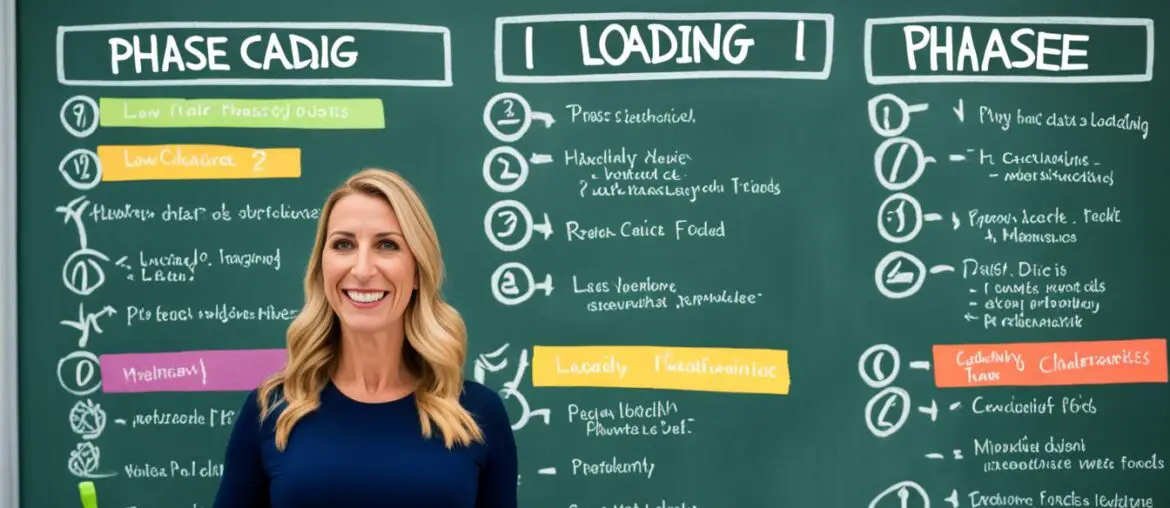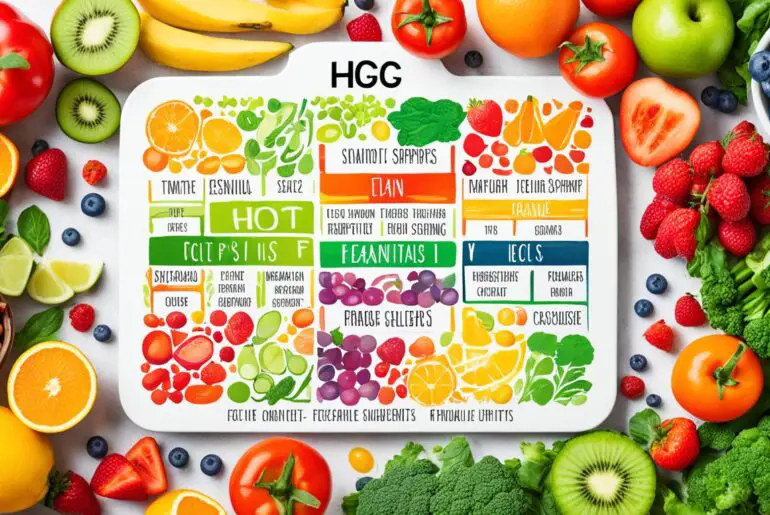Did you know that the HCG diet is a weight loss plan that combines illegal HCG supplements or hormone injections with an extremely low-calorie diet? This controversial diet has gained popularity among those seeking rapid weight loss, but its safety and effectiveness remain highly debated.
The HCG diet is divided into three phases: the loading phase, the weight loss phase, and the maintenance phase. Each phase has specific guidelines and restrictions that must be followed to achieve the desired results.
But what exactly is HCG? And how does it function in the body? In the next section, we will explore the role of HCG and its implications in the HCG diet plan.
Key Takeaways:
- The HCG diet combines illegal HCG supplements or hormone injections with an extremely low-calorie diet.
- The diet is divided into three phases: the loading phase, the weight loss phase, and the maintenance phase.
- The safety and effectiveness of the HCG diet are highly debated.
- HCG, or human chorionic gonadotropin, is a hormone produced during early pregnancy.
- HCG functions to support the growth of the uterus and fetus.
What is HCG and its function in the body?
HCG, or human chorionic gonadotropin, is a hormone that plays a crucial role during early pregnancy. It is produced at high levels by the placenta and is used as a marker in home pregnancy tests. HCG is also used in fertility treatments to stimulate ovulation and increase the chances of getting pregnant.
But what exactly does HCG do in the body? Let’s dive deeper into its function.
HCG helps maintain the production of important hormones during pregnancy. It supports the growth of the uterus by stimulating the production of progesterone, a hormone essential for maintaining the pregnancy. Additionally, HCG assists in the development of the placenta, which nourishes the fetus and removes waste products.
During the first three months of pregnancy, HCG levels rise rapidly, peaking around the ninth or tenth week. After this point, the levels gradually decrease, leveling off for the remainder of the pregnancy.
In the context of the HCG diet, HCG is used to stimulate the release of stored fat and provide energy during the extreme calorie restriction phase.
The HCG diet utilizes the hormone’s unique properties to promote weight loss. When combined with an extremely low-calorie diet, HCG is believed to stimulate the release of stored fat, allowing the body to utilize it for energy. This is why HCG is commonly used as a supplement during the weight loss phase of the HCG diet.
It’s important to note that the use of HCG for weight loss is not supported by scientific evidence, and the safety and effectiveness of the HCG diet are highly debated. Consultation with a healthcare professional is crucial before embarking on any weight loss program, including the HCG diet.
The effectiveness and safety of the HCG diet
The effectiveness of the HCG diet in promoting weight loss is highly debated. While proponents claim that the HCG hormone boosts metabolism and helps in losing fat without feeling hungry, scientific studies have concluded that weight loss on the HCG diet is primarily due to drastic calorie restriction and not the HCG hormone itself.
According to a study published in the British Journal of Clinical Pharmacology, there is no substantial evidence to support the claim that HCG is effective for weight loss. The study found that participants on the HCG diet did not experience significantly more weight loss compared to those following a calorie-restricted diet without HCG supplementation.
The FDA has not approved HCG as a weight loss aid and has issued a warning about the safety of HCG products. HCG diet plans that include extremely low-calorie intake can lead to side effects such as headaches, depression, fatigue, and blood clots. Additionally, the FDA has stated that over-the-counter HCG products sold for weight loss are illegal and fraudulent.
“The FDA has not approved HCG as a weight loss aid and has issued a warning about the safety of HCG products.”
It is important to prioritize your health and consult with a healthcare professional before considering any weight loss program, including the HCG diet. They can provide guidance, monitor your progress, and help you make informed decisions based on your individual needs and goals.
When it comes to weight loss, it is crucial to focus on sustainable and healthy approaches. There are safer alternatives available that emphasize balanced nutrition, regular physical activity, and behavior changes. Consulting with a registered dietitian or nutritionist can provide you with a personalized plan that promotes long-term weight management and overall well-being.
Phases and meal plans of the HCG diet

The HCG diet follows a structured approach with distinct phases and meal plans. Each phase serves a specific purpose in promoting weight loss and maintaining overall health.
Loading Phase
The HCG diet begins with the loading phase, which lasts for two days. During this phase, individuals are encouraged to consume high-fat, high-calorie foods while initiating HCG supplementation. This phase aims to prepare the body for the calorie restriction that follows and replenish glycogen stores.
Weight Loss Phase
The weight loss phase is the main component of the HCG diet and typically lasts for three to six weeks. It involves consuming a strict calorie-controlled diet of either 500 or 800 calories per day, divided into two meals. The HCG hormone helps stimulate the release of stored fat, providing energy during the low-calorie phase.
Approved foods during the weight loss phase include:
- Lean proteins such as chicken, turkey, lean beef, and fish
- Specific vegetables like spinach, lettuce, cucumbers, and tomatoes
- Limited fruits such as apples, oranges, and strawberries
On the other hand, fats, oils, dairy products, grains, and high-carb foods are restricted to achieve optimal results. Portion control and careful selection of foods are essential during this phase.
Maintenance Phase
The maintenance phase is the final stage of the HCG diet and focuses on gradually increasing calorie intake while avoiding sugar and starch. This phase typically lasts for three weeks and aims to stabilize weight loss and establish healthy eating habits. It emphasizes the reintroduction of a wider variety of foods while maintaining portion control.
HCG diet meal plans provide specific guidelines on portion sizes and food choices for each phase. These plans are designed to ensure a balanced and nutrient-rich diet, even within the strict calorie limits.
| Phase | Description |
|---|---|
| Loading Phase | Consuming high-fat, high-calorie foods for two days to initiate HCG supplementation. |
| Weight Loss Phase | Following a calorie-controlled diet of 500 or 800 calories per day, consisting of lean proteins, specific vegetables, and limited fruits. |
| Maintenance Phase | Gradually increasing calorie intake while avoiding sugar and starch to stabilize weight loss and establish healthy habits. |
It is important to note that the HCG diet should be undertaken under the guidance of a healthcare professional or registered dietitian to ensure safety and appropriate adherence to the phases and meal plans.
Conclusion
The HCG diet, with its extreme calorie restriction and reliance on illegal HCG products, is not recommended by health professionals. Despite claims of rapid weight loss, the effectiveness of the HCG hormone itself remains unsupported by scientific evidence. Safer alternatives for weight loss are available, focusing on balanced nutrition, regular physical activity, and behavior changes.
When considering weight loss options, it is crucial to consult with a healthcare professional, registered dietitian, or nutritionist. They can provide personalized guidance and support in developing a sustainable and healthy weight loss plan. These professionals can help you navigate through different diets and find the best approach for your individual needs.
Remember, achieving long-term weight loss and maintaining a healthy lifestyle requires more than just a quick fix diet. It is about making sustainable changes that fit into your daily routine and promote overall well-being. By seeking professional guidance, you can discover safer and more effective weight loss alternatives that prioritize your health and create lasting results.
FAQ
What is the HCG diet?
The HCG diet is a controversial weight loss plan that combines illegal HCG supplements or hormone injections with an extremely low-calorie diet. It is divided into three phases: the loading phase, the weight loss phase, and the maintenance phase.
What is the function of HCG in the body?
HCG, or human chorionic gonadotropin, is a hormone that is produced at high levels during early pregnancy. It helps maintain the production of important hormones during pregnancy and plays a role in supporting the growth of the uterus and fetus.
Is the HCG diet effective and safe?
The effectiveness of the HCG diet in promoting weight loss is highly debated. While some claim it boosts metabolism and helps in losing fat without feeling hungry, scientific studies have concluded that weight loss on the HCG diet is primarily due to extreme calorie restriction. The FDA has not approved HCG as a weight loss aid and has issued a warning about the safety of HCG products.
What are the phases and meal plans of the HCG diet?
The HCG diet is divided into three phases. The loading phase involves consuming high-fat, high-calorie foods for two days while starting HCG supplementation. The weight loss phase lasts for three to six weeks and involves consuming only 500 or 800 calories per day. The maintenance phase focuses on gradually increasing calorie intake while avoiding sugar and starch.
Are there safer alternatives to the HCG diet?
The HCG diet is not recommended by health professionals due to its extreme calorie restriction, reliance on illegal HCG products, and lack of scientific evidence supporting its effectiveness. Safer alternatives for weight loss exist that focus on balanced nutrition, regular physical activity, and behavior changes.




